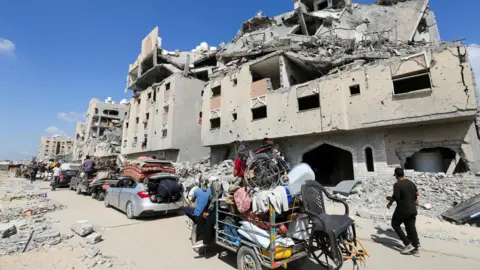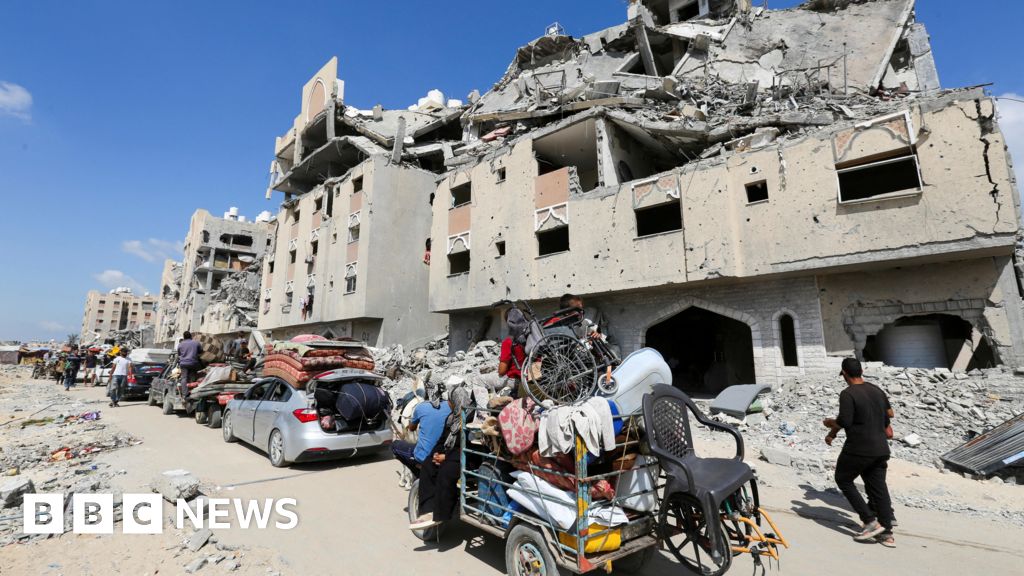 Reuters
ReutersHamas has said a ceasefire plan for Gaza must be based on where talks were a month and a half ago rather than any new rounds of negotiations.
In a statement on Sunday night, the group called on mediators “to present a plan to implement what was agreed upon by the movement on July 2, 2024, based on [President Joe] Biden’s vision and the UN Security Council resolution”.
On 2 July, Hamas issued its response to the outline ceasefire plan announced by Mr Biden on 30 May.
The details of Hamas’s response have not been made public but the group is understood to have dropped a demand for a full ceasefire at the outset rather than an initial six-week pause put forward by the president.
Negotiations resumed a week later, with Hamas accusing Israel of introducing new conditions.
Hamas sources told the BBC that the introduction of the new conditions – that displaced Palestinians should be screened as they return to the north of Gaza, as well as the question of control of the Philadelphi corridor that borders Egypt – have been sticking points.
It has also been widely reported in the Israeli press that these new demands were made by Israel’s Prime Minister Benjamin Netanyahu, and that they have caused friction with his negotiating team.
Last week, international mediators from Qatar, Egypt and the US urged Israel and Hamas to resume urgent discussions on the ceasefire and hostage release deal on 15 August.
The mediators said they were prepared to offer a bridging proposal to overcome differences on the implementation of Mr Biden’s framework agreement.
Israel responded on Thursday, saying it would send a team of negotiators to take part in the meeting.
Hamas rejected any new proposals, but the BBC understands that the group is open to resuming talks at the point prior to which the new conditions were introduced.
On Monday, the leaders of the UK, France and Germany issued a joint call for talks to resume, saying there “can be no further delay”.
UK Prime Minister Sir Keir Starmer, French President Emmanuel Macron and German Chancellor Olaf Scholz echoed the mediators’ call for ceasefire talks to resume in a joint statement.
“We agree that there can be no further delay,” the statement said.
“We have been working with all parties to prevent escalation and will spare no effort to reduce tensions and find a path to stability.”
The countries also called for the de-escalation of tensions in the Middle East – which have risen since the assassination of senior members of Hamas and Lebanese group Hezbollah.
US Defence Secretary Lloyd Austin confirmed on Sunday night that he had ordered the deployment of a guided missile submarine to the Middle East which will join the aircraft carrier USS Abraham Lincoln, which is heading to the region.
Iran previously said it will respond to the killing of Hamas leader Ismail Haniyeh at the “right time” in the “appropriate” manner and that the US bears responsibility for his death because of its support of Israel.
Iran has blamed Israel for the assassination, though Israel has not commented directly.
Meanwhile on Sunday, the Israeli military ordered thousands of Palestinians in Khan Younis, southern Gaza, to relocate to what it has designated “humanitarian zones”.
The relocation order followed an Israeli air strike against a school building in Gaza on Saturday, which killed more than 70 people according to a local hospital director.
Fadl Naeem, head of al-Ahli Hospital where many of the casualties were taken, said around 70 victims were identified in the hours after the strike – with the remains of many others so badly disfigured that identification was difficult.
A spokesman for the Israel Defense Forces (IDF) said the school “served as an active Hamas and Islamic Jihad military facility”, which Hamas denies.
IDF spokesman Rear Adm Daniel Hagari said “various intelligence indications” suggest a “high probability” that the commander of Islamic Jihad’s Central Camps Brigade, Ashraf Juda, was at al-Taba’een school school when it was struck.
He said it is not yet clear whether the commander was killed in the attack.
The BBC cannot independently verify casualty figures from either side.
Israel claims that Hamas is using civilian infrastructure to plan and carry out attacks, and that is why it has been targeting hospitals and schools – sites protected under international law.
Hamas has consistently denied the accusations.
Hamas-led gunmen killed about 1,200 people in an attack on Israel on 7 October, taking 251 others back to Gaza as hostages.
That attack triggered a massive Israeli military offensive against Gaza and the current war.
At least 39,897 Palestinians have been killed in the Israeli campaign, according to Gaza’s Hamas-run health ministry.

